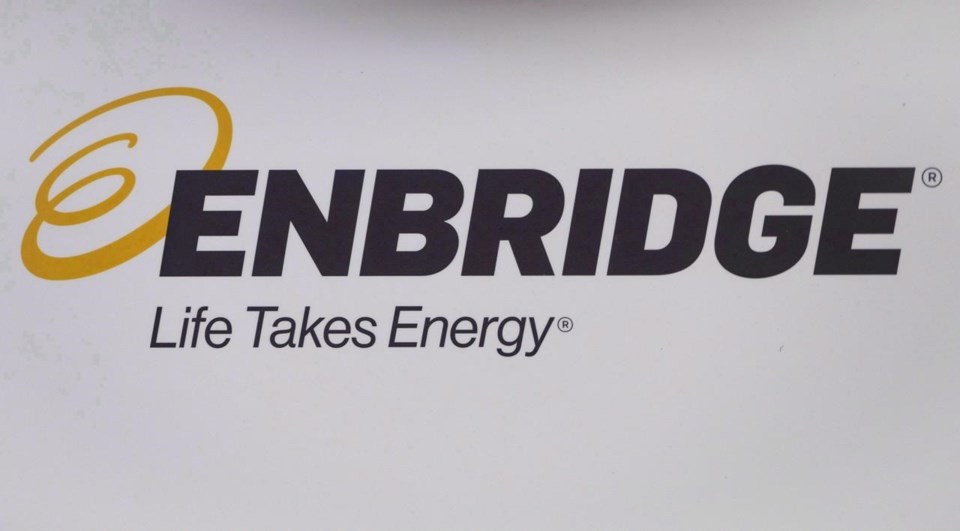CALGARY — Enbridge Inc. is bullish on the future of its Mainline pipeline system in light of projections that Canadian oil output could exceed the country's pipeline export capacity as early as 2026.
CEO Greg Ebel told reporters following the company's investor day in New York on Wednesday that Enbridge now believes Canadian oil production will grow by more than half a million barrels per day before 2030.
"It might be 500,000 in the next three to four years and then I could definitely see a couple hundred thousand barrels after that," Ebel said.
"You know, as soon as people think there's too much pipeline capacity, there's more production being produced and more need for that production, so you need pipelines."
It was not that long ago that industry watchers believed Enbridge's Mainline network, which moves oil to markets in Eastern Canada and the U.S. Midwest, would take a hit when the Trans Mountain pipeline expansion opened and began offering oil companies access to new export markets off the West Coast.
But Ebel said that thesis is now a "stale concept." The Trans Mountain expansion, which will increase the existing Trans Mountain pipeline's capacity by 590,000 barrels per day to a total of 890,000 barrels per day, was supposed to take pressure off Canadian oil producers who for years have struggled with a shortage of export capacity.
But the expansion project has encountered numerous delays through the construction process. Its completion is now imminent and likely to occur sometime in the second quarter of this year.
"Remember TMX was supposed to come in before the end of the decade . . . and it is still not quite in service," Ebel said, adding oil companies have been ramping up output in anticipation of the new export capacity.
"During that time period, the four years plus, (Canadian oil output) has continued to grow and will continue to grow. And as such, the need for additional capacity is still going to be required."
Driven in part by surging demand and also by the expectation of Trans Mountain coming online soon, Canadian oil production has been booming in recent months. During the fourth quarter of 2023, major Canadian oil producers including Canadian Natural Resources Ltd., Imperial Oil Ltd. and Suncor Energy Inc. all broke production records.
Crude oil production in Alberta reached an all-time high in 2023, according to Statistics Canada, and saw its best January ever during the first month of 2024 with output of 3.81 million barrels per day.
Eight Capital analyst Phil Skolnick said in a recent note to clients that the oil boom could revive the old issue of Canadian pipeline shortages sooner rather than later.
"The TMX project took over a decade to complete, raising doubt of another major export pipeline ever being constructed," Skolnick wrote.
"With respect to the longevity of the incremental capacity from TMX, we see exportable supply outpacing pipeline capacity as early as late 2026."
On Wednesday, Enbridge reaffirmed its 2024 forecast for three million barrels per day of oil shipments on its Mainline network, only slightly below the 3.1 million barrels per day annual average achieved in 2023.
Ebel said the Mainline pipeline, which has been expanded in incremental stages many times over the course of its 75-year history, could need additional expansion within the next few years to meet growing demand from Canadian oil producers.
But he said those expansions would be small and occur largely through optimizing the existing network rather than major capital projects.
"I think we're in a good position to help the producers, our customers, ship oil, if that's their desire — and the market would suggest it is — without really significant capital expansions," Ebel said.
Earlier this week, Enbridge announced the Canada Energy Regulator has approved its new tolling deal for the Mainline system. Tolls are the fees oil companies pay to ship their product on a pipeline, and Enbridge had been negotiating a new tolling framework with its oil industry customers for a year and a half.
The new tolling deal will be in place through 2028, and Ebel said its rates will attract barrels not already contracted to the Trans Mountain pipeline, which will have to establish its own finalized tolling structure that reflects the project's rising construction costs.
Trans Mountain Corp. recently said it now expects the cost of the project to come in 10 per cent higher than its May 2023 estimate of $30.9 billion. A final tally is still to come.
Enbridge also announced Wednesday US$500 million in spending on new projects to grow its business in the U.S., including its export terminal in Texas and an expansion of its Gray Oak pipeline, which carries oil from the Permian Basin to the U.S. Gulf Coast.
Enbridge said it will spend about US$100 million to expand its Gray Oak pipeline and add 2.5 million barrels of additional crude oil storage at the Enbridge Ingleside Energy Center terminal, near Corpus Christi, Texas.
This report by The Canadian Press was first published March 6, 2024.
Companies in this story: (TSX:ENB)
Amanda Stephenson, The Canadian Press




